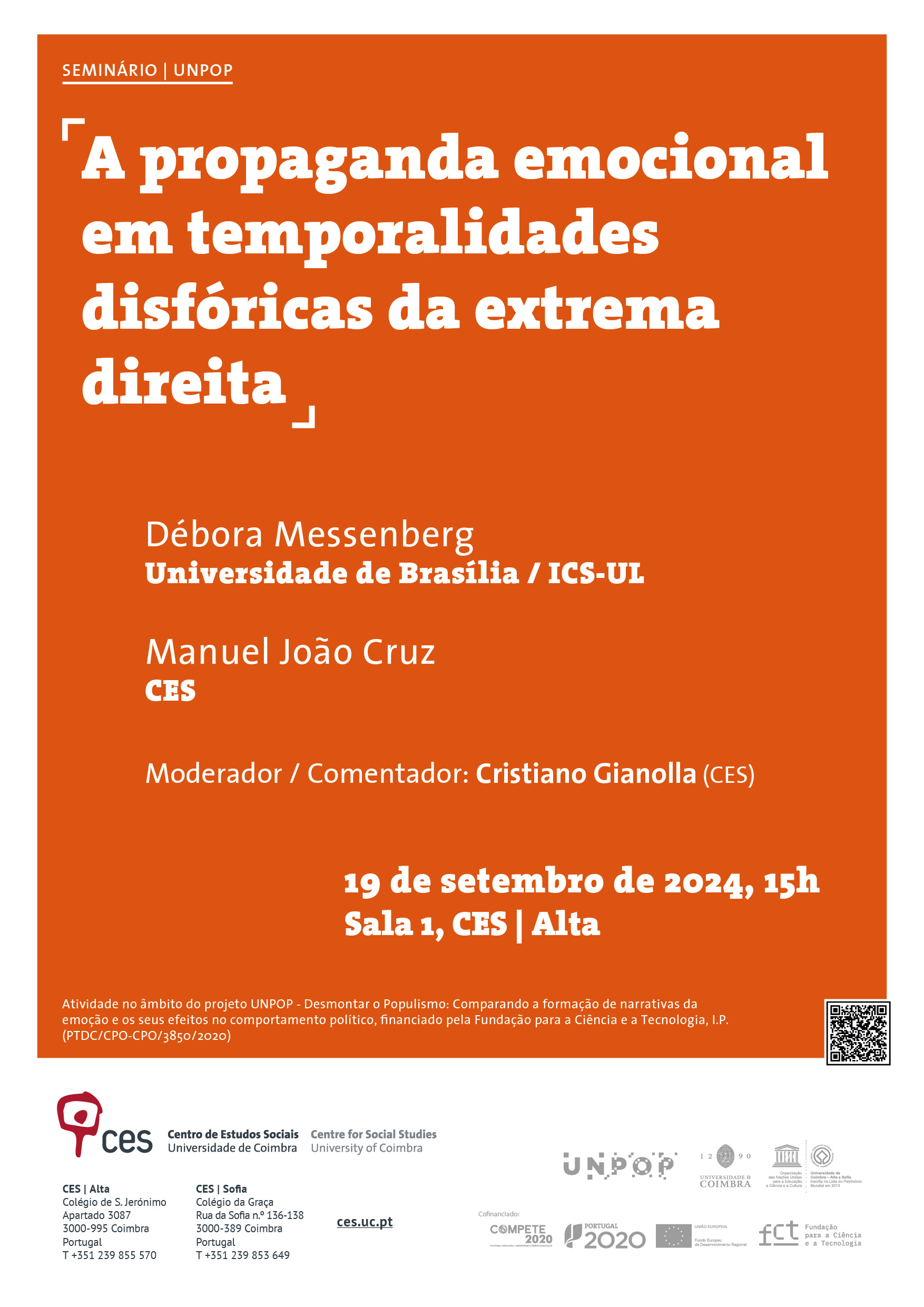Roundtable
Emotional propaganda in the dysphoric temporalities of the extreme right
Débora Messenberg
Manuel João Cruz
September 19, 2024, 15h00
Room 1, CES | Alta
This roundtable explores the communication strategies and emotional effects of extreme-right campaigns, focusing on Bolsonarism and the Portuguese party Chega. Débora Messenberg analyses emotional propaganda at election time, highlighting how affections such as hatred and fear are mobilised for political gain. Manuel João Cruz investigates the populist narratives of André Ventura, leader of Chega, exploring the construction of defined but temporally fragile populist spaces. Through these analyses, we seek to understand the impact of propaganda and narratives on the erosion of global democracy and current political challenges.
Programme
The propagandists of hate: the political agitation of CHEGA and deeply-rooted Bolsonarism in electoral times - Débora Messenberg, Associate Professor in the Department and Postgraduate Programme in Sociology at the University of Brasilia and currently a visiting researcher at the ICS of the University of Lisbon.
The aim is to elucidate the meanings and recurring patterns of the Bolsonaro-rooted agitation and Chega throughout the 2018 and 2024 general elections, respectively, as well as the political affections mobilised in their victorious political propaganda. A survey was carried out of the posts made by some of the main Bolsonaro and Chega opinion makers and digital influencers on their official Facebook pages, Instagram and YouTube channels during the period authorised for electoral propaganda. The electoral success of radical right-wing movements in various parts of the world depends essentially on the fascist propaganda used, which, although a technique, becomes the substance of politics itself. The electoral propaganda of the radical right, as a technique of mass psychology, has revived affections that are central to political mobilisation - hatred, fear, resentment and idolatry - which have been intensely exploited by its agitators as a result of the combination of rational means and irrational ends.
Time and Space in Populist Narratives - Manuel João Cruz, CES
The global erosion of democracy creates fertile ground for the rise of populist phenomena, characterised by a rejection of liberalism. Once seen as an exception, Portugal has seen the emergence of the Chega party, led by André Ventura, since 2019. In this roundtable, I will explore Ventura's populist narrative during his interventions as sole MP in the XIV Legislature of the Assembly of the Republic. Drawing on Marie-Laure Ryan's narrative analysis, I will delve into the spatial and temporal dimensions of these interventions, using Lotman's approach to the semanticisation of space and time. Ventura creates populist spaces that are spatially well-defined but temporally fragile, resulting in a dysphoric and timeless narrative. This lack of temporal anchoring reflects a political identity still in formation, dependent on an unstable present marked by incoherence. Understanding these narrative weaknesses is crucial to deciphering the limitations and challenges that populist discourse poses to contemporary democracy.
Moderation and discussion: Cristiano Gianolla, CES
---
The UNPOP project - UNpacking POPulism: Comparing the formation of emotion narratives and their effects on political behaviour, aims to explore how narratives of emotion allow a deeper analysis of the way populist phenomena constitute and influence political behaviour.
Thus, the series of events developed throughout the project will address several issues involving the recent growth of populism, focusing on the role of emotions - both those considered negative such as anger and fear, and those considered positive such as hope and love - in political behaviour.
UNPOP is coordinated by Cristiano Gianolla e Lisete Mónico and is based at the Centre for Social Studies and by CINEICC - Center for Research in Neuropsychology and Cognitive and Behavioral Intervention of the University of Coimbra, and is funded by the Foundation for Science and Technology (PTDC/CPO-CPO/3850/2020)


